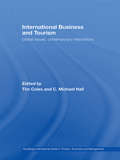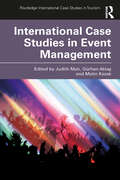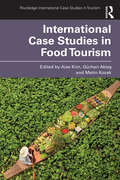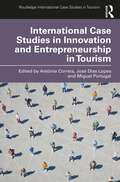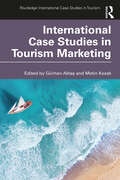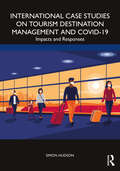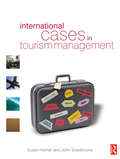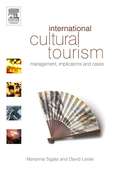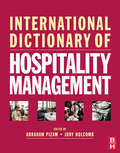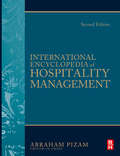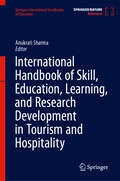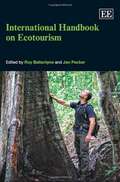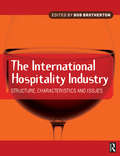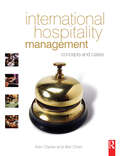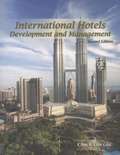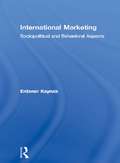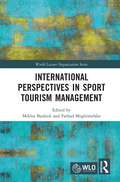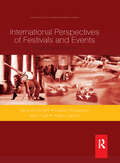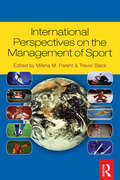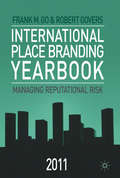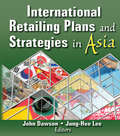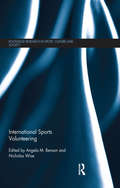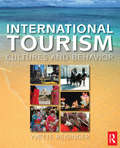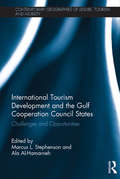- Table View
- List View
International Business and Tourism: Global Issues, Contemporary Interactions
by C. Michael Hall Tim ColesWhether it’s bungee jumping in Queenstown or visiting the Guinness factory in Dublin, where we travel – and what we do when we get there - has changed significantly in the past twenty years. This innovative textbook explores what is possibly the most unrecognized of international service industries, placing tourism in the context of contemporary globalization and trade-in services. It provides new perspectives on tourism as a form of international business, and the implications for firms, the state and individuals. Split into four separate sections, with introductions outlining the key themes in each, it examines important topics such as: the role of governance and regulation in tourism services the effects of increased global mobility on tourism entrepreneurship how tourism businesses are becoming internationalized why other business sectors are increasingly interested in tourism. Case studies are used throughout to highlight important issues, from developments in the aviation industry to the rise of working holidays. This book gets to the core of a crucial service industry, and is essential reading for any researcher or student of tourism or international business.
International Case Studies in Event Management (Routledge International Case Studies in Tourism)
by Metin Kozak Judith Mair Gürhan AktaşThis international case study book provides 27 expertly curated case studies on the topic of events management, each with detailed implementation instructions for the instructor in order to maximise student participation and learning. Embellished with questions, diagrams and data throughout, these case studies have been developed by industry experts and practitioners with the aim of creating a more interactive teaching experience focused on ‘real world’ scenarios within the events industry. Each case study is logically structured and includes an aim and objectives, expected learning outcomes, required background knowledge, steps of implementation in class or online, as well as suggestions for further reading resources. Topics covered range from macro impacts of events on destinations to success criteria in event operations, with the aim of preparing future professionals and equipping them with the necessary skills and competencies to succeed within the events industry. Easy to use and international in scope, this volume is an ideal study resource for use in higher and vocational education, and its unique, teaching-led approach positions it as a vital study tool for instructors and students alike.
International Case Studies in Food Tourism (Routledge International Case Studies in Tourism)
by Metin Kozak Gürhan Aktaş Aise KimThis international case study book provides 28 expertly curated case studies on the topic of food tourism, each with detailed implementation instructions for the instructor to maximise student participation and learning.Embellished with questions, diagrams and data throughout, these case studies have been developed by academic and industry experts with the aim of creating a more interactive teaching experience focused on 'real-world' scenarios within food tourism. Each case study is logically structured and includes an aim and objectives, expected learning outcomes, required background knowledge, steps of implementation in class or online, as well as suggestions for further reading resources. Topics covered range from locally oriented gastronomy identity to innovation and sustainability, with the aim of preparing future professionals and equipping them with the necessary skills and competencies to succeed within the industry.Easy to use and international in scope, this volume is an ideal study resource for use in higher and vocational education, and its unique, teaching-led approach positions it as a vital study tool for instructors and students alike.
International Case Studies in Innovation and Entrepreneurship in Tourism (Routledge International Case Studies in Tourism)
by Antonia CorreiaThis international case study book provides 23 expertly curated case studies on entrepreneurship and innovation in tourism, each with detailed implementation instructions for the instructor to maximise student participation and learning.The dynamic characteristic of the tourism industry under the influence of micro and macro environment factors requires future professionals to be equipped with appropriate skills and competencies to deal with change and development in real-life practices. Curated and developed by industry experts and practitioners, these case studies embody real-world scenarios with the aim of best preparing students for their future careers. This compelling set of case studies explores the dynamics of entrepreneurship in global context, analyses emerging markets and new business models, and elicits the implications of innovation and entrepreneurship in different contexts and within a transdisciplinary perspective. The cases illustrate innovation and entrepreneurship as an accelerator of tourism growth and development, under a sustainable perspective.With reflective questions throughout to aid both in-class discussion and self-study, this book is an ideal study resource for use in higher and vocational education, and its unique, teaching-led approach positions it as a vital study tool for instructors and students alike.
International Case Studies in Tourism Marketing (Routledge International Case Studies in Tourism)
by Gürhan AktaşThis international case study book provides 27 expertly curated case studies on the topic of tourism marketing, each with detailed implementation instructions for the instructor in order to maximise student participation and learning. The dynamic characteristic of the industry under the influence of micro and macro environment factors requires future professionals to be equipped with appropriate skills and competencies to deal with such factors in real-life practices. Curated and developed by industry experts and practitioners, these case studies embody real-world scenarios with the aim of best preparing students for their future careers. This compelling set of case studies follows a logical and uniform structure and covers topics such as marketing mix, crisis management, digital marketing, quality development, product development and sustainability. With reflective questions throughout to aid both in-class discussion and self-study, this book is an ideal study resource for use in higher and vocational education, and its unique, teaching-led approach positions it as a vital study tool for instructors and students alike.
International Case Studies on Tourism Destination Management and COVID-19: Impacts and Responses
by Simon HudsonInternational Cases on Tourism Destination Management and COVID-19 provides students, lecturers and practitioners with an essential real-life resource on how different tourism destinations around the world have been impacted by, and responded to, the COVID-19 pandemic. These 34 in-depth case studies from the Americas, the APAC region, Europe, and the Middle East allow a global perspective, and acts as a toolkit than can be used to design a better future for tourism destinations that embraces sustainability and collaboration. For each case study, secondary sources such as media articles, industry and government reports, campaign materials, websites and social media channels have been closely analysed. In addition, interviews have been conducted with destination marketers, government officials, tour operators, professional guides, and hotel managers to provide a holistic view for each destination. Each case study is structured around COVID-19 impacts, responses and outcomes, and includes further reading, video links, and discussion questions to challenge students further in their self-study and to encourage in-class discussions. This is an essential resource for tourism students and lecturers across the curriculum, and a fascinating read for anyone in the business of tourism.
International Cases in Tourism Management
by John Swarbrooke Susan HornerInternational Cases in Tourism Management includes:* Profiles of individual companies* Case studies on destination management and marketing* Material on different management functions in tourism, such as marketing and human resource management* Case studies of particular types of tourism, such as ecotourism and cultural tourismThe case studies are supplemented by exercises and questions, which ensure that for students and tutors alike the book is the ideal accompaniment to all tourism courses.
International Cultural Tourism
by David Leslie Marianna SigalaInternational Cultural Tourism: management, implications and cases provides a comprehensive exploration of the management, operations and marketing of cultural tourism attractions and resources in a global context. Topics explored include: * For the first time, an evaluation of the use and transformational impact of global media and new ICT in the management and marketing of cultural tourism attractions and resources. * The changing nature of the global cultural tourism marketplace (including demand, supply, product development and political changes). * Consumer behaviour, profiles and motivations of cultural tourists.* Environmental performance, management and wider issues of social and cultural sustainability.Written by a team of contributors from Australia, Hong Kong, UK, US, Canada, Mexico, Portugal, South Africa and Finland, this text provides a thoroughly global insight into the issues and techniques involved in the successful management and marketing of cultural attractions.* An overview of the way in which cultural tourism resources and attractions are managed and marketed in a global context. * Analysis of the demand, profiles and motivation of tourists * An investigation of the transformational and dynamic impacts of new technologies on cultural resources and products * International contributor team provide case studies from first-hand experience and research
International Dictionary of Hospitality Management
by Abraham Pizam Judy HolcombThe International Dictionary of Hospitality Management is the must have companion for all those working or studying in the field of hospitality management. With over 728 entries, it covers everything you need to know, from a concise definition of back office systems, to management accounting and yield management.It covers all of the relevant issues in the field of hospitality management from both a sectoral level:* Lodging* Restaurants and Food service* Time-share* Clubs* EventsAs well as a functional one:* Accounting and Finance* Marketing* Strategic Management* Human Resources* Information Technology* Facilities ManagementAn abridged version of the successful International Encyclopedia of Hospitality Management, its user friendly layout provides readers with quick and concise answers across this diverse area of industry.
International Encyclopedia of Hospitality Management 2nd edition
by Abraham PizamThe International Encyclopedia of Hospitality Management is the definitive reference work for any individual studying or working in the hospitality industry. There are 185 Hospitality Management degrees in the UK alone. This new edition updates and significantly revises twenty five per cent of the entries and has an additional twenty new entries. New online material makes it the most up-to-date and accessible hospitality management encyclopedia on the market. It covers all of the relevant issues in the field of hospitality management from a sectoral level (lodging, restaurants/food service, time-share, clubs and events) as well as a functional one (accounting and finance, marketing, strategic management, human resources, information technology and facilities management). Its unique, user-friendly structure enables readers to find exactly the information they require at a glance – whether they require broad detail that takes a more cross-sectional view across each subject field or more focused information that looks closely at specific topics and issues within the hospitality industry today.
International Handbook of Skill, Education, Learning, and Research Development in Tourism and Hospitality (Springer International Handbooks of Education)
by Anukrati SharmaThis handbook provides new dimensions and directions to design tourism education curriculums and transform students' learning. It delves into issues such as job opportunities, business opportunities, required skill sets, and the role of critical and creative thinking in tourism education, and focuses on a shift in mindset from R&D (research and development) to L&D (learning and development), to aid in gaining in-the-field knowledge. It presents a global perspective on the latest trends, innovative curriculum, research, and skill needs in the travel, tourism, and hotel industry via empirical, theoretical, and conceptual chapters, as well as through global case studies. This handbook explores how to develop the skills, attributes and prospects for employment in these competitive industries, and also highlights what employers in the tourism and hospitality sectors expect from graduate and/or post-graduate candidates. Besides examining the contribution of tourism education towards a better society, this handbook introduces a new way of designing curriculums, and examines the past practices, current trends, and future opportunities in the field.
International Handbook on Ecotourism
by Roy Ballantyne Jan PackerThis Handbook brings together contributions from over forty international experts in the field of ecotourism. It provides a critical review and discussion of current issues and concepts - it challenges readers to consider the boundaries of what ecotourism is, and could be. The Handbook provides practical information regarding the business of ecotourism; insights into ecotourist behavior and visitor experiences; and reflections on the practice of ecotourism in a range of different contexts. The Handbook is designed to be a valuable reference book for tourism scholars and researchers.
International Hospitality Industry: Structure, Characteristics And Issues
by Bob BrothertonWith contributions from leading figures in the field The International Hospitality Industry looks at both specific sectors of the industry, such as restaurants, cruises, hotels and contract foodservice. The book moves on to highlight the key issues that will be encountered within every sector of the industry - operations, IT, marketing and HR among others - thereby providing the reader with an all-encompassing and comparative overview of the field.
International Hospitality Management: Concepts And Cases
by Alan Clarke Wei ChenInternational Hospitality Management: issues and applications brings together the latest developments in global hospitality operations with the contemporary management principles. It provides a truly international perspective on the hospitality and tourism industries and provides a fresh insight into hospitality and tourism management. The text develops a critical view of the management theory and the traditional theories, looking at how appropriate they are in hospitality and tourism and in a multicultural context. The awareness of cultural environments and the specifications imposed by those cultures will underpin the whole text.International Hospitality Management is designed to instil a greater awareness of the international factors influencing the strategies and performances of hospitality organisation. The approach focuses on a critical analysis of the relevance and application of general management theory and practice to the hospitality industry. Consisting of three 3 parts divided into 14 chapters, each of which deals with a major topic of international management, the book has been thoroughly developed with consistent learning features throughout, including:Specified learning outcomes for each chapterInternational case studies including major world events such as the September 11 Terrorist Attacks, the Argentine Financial Crisis, The SARS virus, The Institution of Euro, the accession of China to the World Trade Organization., and the expansion of European Union, as well as international corporations such as Marriott, Hilton, Intercontinental, McDonalds, Starbucks etc. It introduces the global market situation, including Americas, Europe, Asia Pacific, and Middle East. Study questions and discussion questions to consolidate learning and understanding.Links to relevant websites at the end of each chapterOn-line resources and a test bank is available for lecturers and students
International Hotels: Development and Management
by Chuck Yim GeeThis text is intended to assist hospitality educators who are interested in teaching hotel management from an international perspective by providing a text that treats various aspects of hotel development and management in international terms. Throughout the text, there has been an attempt to integrate personal observations, academic perspectives, and research with actual examples from hotels around the world, so that professionals working in the field, as well as students of hospitality management, may find information of substantive value.
International Marketing: Sociopolitical and Behavioral Aspects
by Erdener KaynakSocial, economic, political, business, and cultural environmental factors affect the international marketing operation and performance of international firms. This highly insightful volume focuses on four of the most significant forces with which companies must deal on an international level--macro international marketing issues, sociopolitical int
International Perspectives in Sport Tourism Management (World Leisure Organization Series)
by Farhad Moghimehfar Miklos BanhidiThis timely book critically explores the past, present, and future trends and needs of sport tourism development from a global perspective.Sports have become a major demand generator for many countries around the world, and consequently, the growth and status of this phenomenon is a major aspect of sport tourism. The volume includes case studies from all over the world, including industrializing countries and the Global South. Sporting events and sport tourism are two fast-growing sectors of tourism, and this book provides a current view of the interconnectedness of sport and tourism from behavioral, historical, economic, management, marketing, environmental, and policy perspectives. In doing so, issues, trends, and topics such as commercial, e-sport, emotional well-being, health, and cultural aspects of sports travelers are explored in detail.This significant and insightful volume will be of pivotal interest to academics, students, and professionals in the field of sport tourism, as well as related areas, such as development studies, psychology, sociology, and geography.
International Perspectives of Festivals and Events: Paradigms Of Analysis
by Alan Fyall Adele Ladkin Martin Robertson Jane Ali-KnightInternational Perspectives of Festivals and Events addresses contemporary issues concerning the potential of festivals and events to produce economic, social, cultural and community benefits. Incorporating a range of international perspectives, the book provides the reader with a global look at current trends and topics, which have until now, been underrepresented by current literature. International Perspectives of Festivals and Events includes a broad range of research, case studies and examples from well-known scholars in the field to form a unified volume that informs the reader of the current status of festivals and events around the world. In a fast-moving industry where new theory and practice is implemented rapidly, this is essential reading for any advanced student or researcher in festivals and events.
International Perspectives on the Management of Sport
by Trevor Slack Milena M. ParentInternational Perspectives on the Management of Sport is the first multi-contributed book that addresses the various aspects of sport management by some of the most brilliant experts throughout the world. Drawing on the knowledge of international sport management gurus, this book provides cutting-edge ideas from those at the forefront of the industry. A particular emphasis is placed on the rapidly evolving fields of Organizational Theory and Economic Policy and their relation to sport.Contributors include Wladimir Andreff, Laurence Chalip, Jean-Loup Chappelet, Packianathan Chelladurai, Rodney Fort, Bill Gerard, Dennis Howard, Trevor Slack and many others.
International Place Branding Yearbook 2011: Managing Reputational Risk
by Frank M. Go Robert GoversThe second annual volume of the International Place Branding Yearbook; this collection looks at the case for applying brand and marketing strategies and to the economic, social, political and cultural development of cities, towns and regions around the world to help them compete in the global, national and local markets.
International Retailing Plans and Strategies in Asia
by John Dawson Erdener Kaynak Jung-Hee LeeLearn the how, when, and why of entering Asian marketsRetailers entering Asia are faced with not only a consumer and retail culture very different from their own, but with a variety of cultures that vary greatly among countries within the continent. International Retailing Plans and Strategies in Asia examines the strategies of Western retailers entering into Asian markets and provides specific case examples showing why some companies have failed in Asia-as well as factors that helped others succeed. Important concepts for international retailers exploring Asian markets are clearly explained, and the material is particularly relevant to current WTO and UNCTAD debates about the globalization of retail markets. Helpful tables, charts, and illustrations make complex information easy to access and understand.International Retailing Plans and Strategies in Asia examines: how foreign investment influences domestic retail systems how strategies for entering European markets can be adapted and applied to various Asian markets the important practice of incorporating local cultural values into trading relationships in Asian markets the investment of Japanese retailers in China and the trend toward internationalization in Asia by Asian retailers the evolution of foreign investment in Korea-with a look at foreign firms&’ specific investment strategies issues of local competition and the need for foreign firms to adapt to local consumer cultures, particularly as analyzed in case studies of Metro Cash and Carry, Toys R Us, and Carrefour what understanding foreign markets means in terms of adaptation and success for retailers and wholesalersThe material in these pages will help to inform business decisions about how to (and how not to) enter foreign markets and whether or not it is proper for governments to intervene. The chapters in this book, originally presented as papers at a workshop held at Chung-Ang University in Seoul in November 2003, address issues of diversity in international retailing and distribution in Asia. International Retailing Plans and Strategies in Asia is designed to be essential reading for international marketing students, retail researchers, business managers, and policymakers, and to be a useful addition to university business school library collections.
International Sports Events: Impacts, Experiences and Identities (Advances in Tourism)
by Alan Fyall Richard ShipwayThis book offers new insight into International Sports Events (ISEs), examining the relationship between sport, tourism and events. It assesses sports events through the lens of both sports participants and spectators, based on three primary themes: impacts, experiences and identities. The first section of the book contributes to the future development of knowledge by analyzing the impact of sport events and their legacies from economic, environmental, social, sporting, political and cultural perspectives – an understanding of the impacts and potential legacies of sports events is fundamental to their future development. In the second section of the book, the focus moves from impact and legacy issues towards exploring consumer behaviour and participant experiences at a diverse selection of International Sports Events. The emphasis within this section is grounded within the tourism dimension of sports events. Section three of the book highlights the dominant role of identity at a diverse selection of sports events, and demonstrates how that identity is displayed whilst either watching or participating in sport and leisure. The book provides an international analysis drawing on emerging empirical research conducted across a diverse range of sport and leisure activities and contrasting locations. Linked to the three underlying themes of the book, a future research agenda for International Sports Events is provided which is centred on four key pillars: impact, identity, internationalization and interdisciplinary research. This timely book will be of interest to students, researchers and academics studying Event Management, Sport Management and Sport Tourism.
International Sports Volunteering (Routledge Research in Sport, Culture and Society)
by Nicholas Wise Angela M. BensonSport volunteering is becoming an increasingly popular motive for international travel. Many tourism organisations now advertise sport volunteering projects, with colleges and universities also offering students the opportunity to participate in similar projects abroad. This is the first book to bring together diverse and interdisciplinary insights into the development of the contemporary sport volunteering phenomenon. It addresses conceptual uncertainties and challenges emerging from the growing international sport volunteering market, and offers insight into its future directions, impact and sustainability. Drawing on both quantitative and qualitative methodologies, Part I examines volunteering in the context of international sporting events, while Part II evaluates volunteering initiatives related to sport development. Including case studies from Australia, Cameroon, Namibia, Norway, Russia, the UK, the US and Zambia, this substantial volume provides a truly international perspective on the changing roles of sport volunteering. Showcasing the latest research from across the globe, International Sports Volunteering is a valuable resource for any course on sport studies, sport event management, sport development, sport tourism, sport geography, the sociology of sport or leisure studies.
International Tourism
by Yvette Reisinger Frederic DimancheIn recent years there has been a considerable interest in the cultural aspects of tourism such as the impacts of culture on tourism planning, development, management, and marketing. However, the focus has been on material forms of culture such as arts, music, or crafts. The impacts of national culture on tourist behavior and travel decision-making have not been paid much attention. Only in the last two years have cross-cultural issues begun to generate significant interest among academics.An examination of cultural characteristics and differences is extremely important to the tourism industry because today’s tourism environment is becoming increasingly international. Information on the nature of the cultural differences between international tourists and locals is not readily available in tourism literature. The concept of culture is very complex and includes such abstract concepts as satisfaction, attitude and loyalty. International Tourism brings these concepts to the undergraduate student in tourism, as well as students in the related fields of marketing, management, international business, and cross-cultural communication. Designed as a textbook, it isorganized and presented in an integrated and relevant way for the benefit of a worldwide audience.
International Tourism Development and the Gulf Cooperation Council States: Challenges and Opportunities (Contemporary Geographies of Leisure, Tourism and Mobility)
by Marcus L. Stephenson Ala Al-HamarnehThis book examines the challenges facing the development of tourism in the six member states of the Gulf Cooperation Council (GCC): Bahrain, Kuwait, Oman, Qatar, Saudi Arabia and the United Arab Emirates (UAE). This region, which largely comprises the Arabian Peninsula, possesses some of the fastest growing economies in the world and is remarkably unique. It shares similar associations and affinities: tribal histories, royal kinship, political associations, Bedu cultural roots, Islamic heritage, rapid urbanization, oil wealth, rentier dynamics, state capitalist structures, migrant labour, economic diversification policies and institutional restructuring. Therefore, this volume takes the study of tourism away from its normative unit of analysis, where tourism in the region is being examined within the context of the Middle East and the wider Islamic and Arab world, towards an enquiry focusing on a specific geo-political territory and socially defined region. Although international tourism development in the region embodies a range of challenges, complexities and conflicts, which are deeply contextualized in this volume, the approach overall does not endorse the normative ‘Gulf bashing’ position that has predominated within the critical enquiries in the region. It presents a forward-looking and realistic assessment of international tourism development, examining development potentialities and constructive ways forward for GCC states and the region as a whole. This edited volume provides a real attempt to examine critically ways in which tourism and its development intersect with the socio-cultural, economic, political, environmental and industrial change that is taking place in the region. By doing so, the book provides a theoretically engaged analysis of the social transformations and discourses that shape our contemporary understanding of tourism development within the GCC region. Moreover, it deciphers tourism development’s role within the context of the GCC states undergoing rapid transformation, urbanization, ultra-modernization, internationalization and globalization. In addition to state-specific illustrations and destination case studies, the work provides insights into relatable themes associated with international tourism development in the region, such as tourism’s relationship with religion, heritage and identity, the environment and sustainability, mobility and cross-border movements, the transport industry, image production and destination branding, mega-development and political stability and instability. The book combines theory with diverse case study illustrations, drawing on disciplinary knowledge from such fields as sociology, political economy and social geography. This timely and original contribution is essential reading for students, researchers and academics in the field of tourism studies and related subject areas, along with those who have regional interests in Middle East studies, including Gulf and Arabian Peninsula studies.
